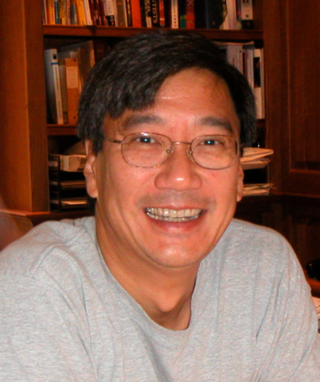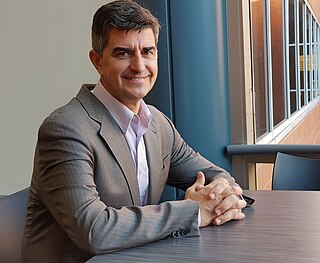
3D printing or additive manufacturing is the construction of a three-dimensional object from a CAD model or a digital 3D model. It can be done in a variety of processes in which material is deposited, joined or solidified under computer control, with the material being added together, typically layer by layer.

Joseph Lyman DeRisi is an American biochemist, specializing in molecular biology, parasitology, genomics, virology, and computational biology.

Kristina M. Johnson is an American professorial electrical engineer, business executive and academic administrator. She is an elected member of the National Academy of Engineering.

Chandra Kumar Naranbhai Patel (born 2 July 1938) is an electrical engineer. He developed the carbon dioxide laser in 1963; it is now widely used in industry for cutting and engraving a wide range of materials like plastic and wood. Because the atmosphere is quite transparent to infrared light, CO2 lasers are also used for military rangefinding using LIDAR techniques.
The Presidential Early Career Award for Scientists and Engineers (PECASE) is the highest honor bestowed by the United States federal government on outstanding scientists and engineers in the early stages of their independent research careers. The White House, following recommendations from participating agencies, confers the awards annually. To be eligible for a Presidential Award, an individual must be a U.S. citizen, national, or permanent resident. Some of the winning scientists and engineers receive up to a five-year research grant.

Anthony Atala is an American bioengineer, urologist, and pediatric surgeon. He is the W.H. Boyce professor of urology, the founding director of the Wake Forest Institute for Regenerative Medicine, and the chair of the Department of Urology at Wake Forest School of Medicine in North Carolina. His work focuses on the science of regenerative medicine: "a practice that aims to refurbish diseased or damaged tissue using the body's own healthy cells".

Peter S. Kim is an American scientist. He was president of Merck Research Laboratories (MRL) 2003–2013 and is currently Virginia & D.K. Ludwig Professor of Biochemistry at Stanford University, Institute Scholar at Stanford ChEM-H, and Lead Investigator of the Infectious Disease Initiative at the Chan Zuckerberg Biohub.

Shree K. Nayar is an engineer and computer scientist known for his contributions to the fields of computer vision, computational imaging, and computer graphics. He is the T. C. Chang Professor of Computer Science in the School of Engineering at Columbia University. Nayar co-directs the Columbia Vision and Graphics Center and is the head of the Computer Vision Laboratory (CAVE), which develops advanced imaging and computer vision systems. Nayar also served as a director of research at Snap Inc. He was elected member of the US National Academy of Engineering in 2008 and the American Academy of Arts and Sciences in 2011 for his pioneering work on computational cameras and physics based computer vision.

Zhenan Bao is a Chinese-born American chemical engineer. She serves as K. K. Lee Professor of Chemical Engineering at Stanford University, with courtesy appointments in Chemistry and Material Science and Engineering. She served as the Department Chair of Chemical Engineering from 2018 to 2022. Bao is known for her work on organic field-effect transistors and organic semiconductors, for applications including flexible electronics and electronic skin.

Yury Georgievich Gogotsi is a scientist in the field of material chemistry, professor at Drexel University, Philadelphia, United States since 2000 in the fields of Materials Science and Engineering and Nanotechnology. Distinguished University and Trustee Chair professor of materials science at Drexel University — director of the A.J. Drexel Nanotechnology Institute.
Continuous Liquid Interface Production is a proprietary method of 3D printing that uses photo polymerization to create smooth-sided solid objects of a wide variety of shapes using resins. It was invented by Joseph DeSimone, Alexander and Nikita Ermoshkin and Edward T. Samulski and was originally owned by EiPi Systems, but is now being developed by Carbon.
Carbon, Inc. is a digital manufacturing company that manufactures and develops 3D printers utilizing the Continuous Liquid Interface Production process. The company was founded in 2013, and maintains its headquarters in California, United States.
Jelena Vučković is a Serbian-born American professor and a courtesy faculty member in the Department of Applied Physics at Stanford University. She served as Fortinet Founders Chair of the Department of Electrical Engineering at Stanford University from August 2021 through June 2023. Vučković leads the Nanoscale and Quantum Photonics (NQP) Lab, and is a faculty member of the Ginzton Lab, PULSE Institute, SIMES Institute, and Bio-X at Stanford. She was the inaugural director of the Q-FARM initiative. She is a Member of the National Academy of Sciences, and a Fellow of The Optical Society, the American Physical Society and the Institute of Electrical and Electronics Engineers.
The Ullyot Public Affairs Lecture is an annual public lecture which focuses on contributions of the sciences to the public welfare. The lecture is presented jointly by the Science History Institute, the American Chemical Society (ACS), the University of Pennsylvania, and the University of the Sciences. The lecture was endowed in 1990 by Glenn Edgar Ullyot, a research chemist at Smith, Kline & French, and his wife Barbara Hodsdon Ullyot. Since 1997, the lecture has been presented at the Science History Institute in Philadelphia, Pennsylvania.
The Percy L. Julian Award was first given in 1975 by the National Organization for the Professional Advancement of Black Chemists and Chemical Engineers (NOBCChE). The award is given every one to two years. It honors black scientists who have made significant contributions to the areas of pure or applied research in science or engineering.

Li Lanjuan, also romanized as Lan-Juan Li, is a Chinese epidemiologist and hepatologist. She is a professor at Zhejiang University School of Medicine, an academician of the Chinese Academy of Engineering, and serves as the director of the State Key Laboratory for Diagnosis and Treatment of Infectious Diseases. She developed Li-NBAL, an artificial liver support system that is used to sustain the lives of people suffering from acute liver failure, and won multiple national awards for her roles in combatting the SARS, H1N1, and H7N9 epidemics.

High-area rapid printing (HARP) is a stereolithography (SLA) method that permits the continuous, high-throughput printing of large objects at rapid speeds. This method was introduced in 2019 by the Mirkin Research Group at Northwestern University in order to address drawbacks associated with traditional SLA manufacturing processes. Since the polymerization reactions involved in SLA are highly exothermic processes, the production of objects at high-throughputs is associated with high temperatures that can result in structural defects. HARP addresses this problem by utilizing a solid-liquid slip boundary that cools the resin by withdrawing heat from the system. This allows for large structures to be fabricated quickly without the temperature-associated defects inherent to other SLA processes.
Audrey K. Ellerbee Bowden is an American engineer and Dorothy J. Wingfield Phillips Chancellor's Faculty Fellow at Vanderbilt University, as well as an Associate Professor of Biomedical Engineering and Electrical Engineering. She is a Fellow of Optica, the American Institute for Medical and Biological Engineering and the International Society for Optics and Photonics (SPIE).

Rohit Srivastava is a Himanshu Patel Chair Professor in the Department of Biosciences and Bioegineering at IIT Bombay specialising in medical diagnostic devices, nanoengineered materials and photothermal cancer therapy. He was awarded the Shanti Swarup Bhatnagar Prize for Science and Technology in Medical Sciences in the year 2021 for his contributions to the development of affordable medical devices.












